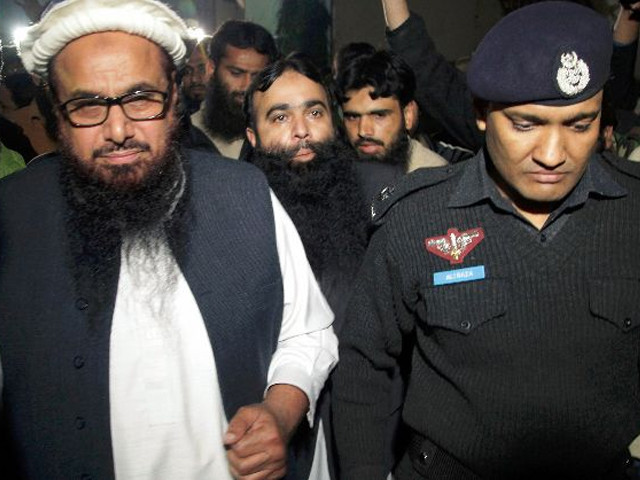Media reports both in Pakistan and outside feel that the Pakistan Muslim League-Nawaz (PML-N) regime in Islamabad acted either under the influence and fear of the new ruler in Washington or it buckled under Beijing’s pressure.
#BREAKING: Terrorist Hafiz Saeed releases video after he was put in house arrest, claims Modi-Trump friendship led to action against him. pic.twitter.com/V5qYI4FTWC
— Aditya Raj Kaul (@AdityaRajKaul) January 30, 2017
The arrest of Saeed comes just days after Donald Trump imposed a visa ban for seven Muslim countries. It came at a time when there were reports making rounds that Pakistan might be the next addition on the ban list. However, some believe that China played a role in the incarceration of the Jamaatud Dawa (JuD) leader, who is suspected to be the main accused in the 26/11 Mumbai terror attacks in 2008.
The argument is that Pakistan’s all-weather friend needs security for the huge investment it is making in the Islamic republic and, therefore, it is essential that extremist forces are contained. One school of thought also believes that the communist regime wants to pave the way for the resumption of dialogue between New Delhi and Islamabad, thereby neutralising the forces in Pakistan that thrive on anti- India rhetoric. Some say that China wants to be the new America in South Asia and play the role of the big brother that Washington has been playing so far.
Pakistan, however, claims that it was sheer national interest that guided the action against Saeed. India, which has long been demanding the arrest and prosecution of the JuD chief for his alleged involvement in the 26/11 attack does not want to trust Pakistan’s narrative. According to India, Nawaz Sharif acted under pressure from Trump and the detention is just hogwash, and sooner or later, Saeed will start moving about like a free bird as has happened in past.
New Delhi’s cynicism derives from past experiences, when Pakistan had put Saeed under house arrest for the first time in 2001, immediately after the attack on the Indian parliament, but it was only a few weeks later that he walked out a free man. Then, in 2006, after the Mumbai train attacks, the Indian government forced Islamabad to act against the terror mastermind, and Saeed again saw a few weeks of incarceration but was set free without any charges. His last house arrest was after the 26/11 attacks but the court set him free in the absence of any credible evidence.
The context of the latest detention is different – both the army and the civilian regime seem to be on the same page and this has been done at a time when the Islamic republic is in the middle of its fight against insurgents and extremist forces. If one goes by editorials and opinion pieces in Pakistani newspapers, the popular mood is also against such sectarian forces, which have created instability in the country, giving it bad name globally. The action also comes at a time when the international opinion is in favour of zero tolerance towards radical Islamic groups.
Currently, Islamabad’s intentions are being closely watched to see whether it initiates criminal proceedings against Saeed or not. Since Saeed’s arrest offers an opportunity for New Delhi to reach out to Islamabad and initiate the stalled dialogue once again, Islamabad will have to go an extra mile to demonstrate its sincerity in fighting terror organisations and individuals. One of India’s major preconditions for dialogue has been for Pakistan to take action against Saeed and those involved in the 26/11 attacks, which Pakistan seems to be doing.
Someone like Saeed derives his leitmotif from anti-India rhetoric and uses the Kashmir issue to spread his terror tentacles. If Pakistan is to be blamed for nurturing Saeed and other terror groups, India is equally guilty of giving such individuals the reasons to gain political oxygen. New Delhi’s high handedness in Kashmir and no sincere attempt to address the problems in the Valley are the reasons that terror groups justify their nefarious activities. India cannot shy away from the reality that the Kashmir issue provides leitmotif for many terror groups across the border to survive and create instability in South Asia.
Being one of the largest democracies in South Asia, India needs to address the problems of the Valley and normalise its relationship with the western neighbour, a bit more responsibly, in order to neutralise people like Saeed. When we suspend dialogue, we play in the hands of Saeed, leaving ourselves exactly where he wants us to be.
Both the countries need to realise that what is important is not Saeed’s house arrest but it is the idea that gives birth to such terror masterminds that needs to be deliberated upon.



COMMENTS
Comments are moderated and generally will be posted if they are on-topic and not abusive.
For more information, please see our Comments FAQ